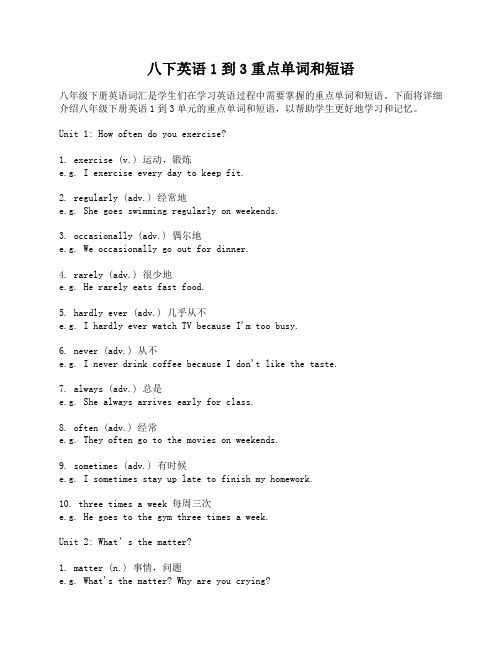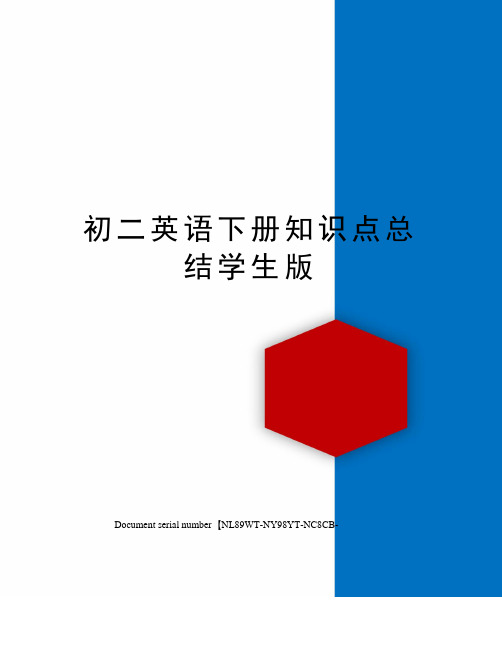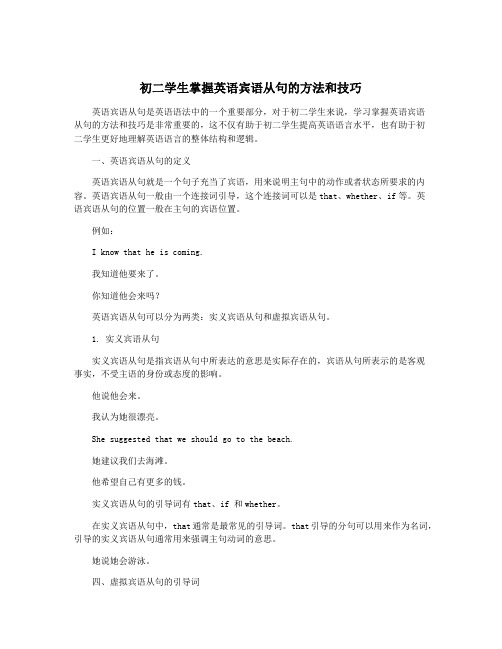初二英语下册知识点总结学生版
春季13-八年级英语培优版-下册Unit6 Travel-学生版

Ⅰ. Important words:1._____________ n.吸引(力),吸引人的事物______________ adj.吸引人的,有魅力的______________ v.吸引2.______________ v.意思是,指的是______________ v.打算(跟不定式to do)______________ n.含义,意义3.______________ v.组织______________ n.组织4.______________ adj.完全的______________ adv.完全的5.______________ adj.滑稽可笑的______________ n. 乐趣6.______________ adv.往国外______________ adv./ prep. 在(上)船/飞机/车7.______________ adj.令人惊奇的______________ adj.感到惊奇的8.______________ v.生产的______________ n.产品9.______________ n.文化10.______________ adj.有能力的Unit6 Travel 同步教案pretend (not) to do sth. 假装(不)做某事【拓展2】teenagers under the age of 18 年龄用介词under/ overkids below 130 cm 身高用介词below/ above【拓展3】enter sp.= go/ walk into sp. 进入某地enter 不与into连用3.It is a precious memory that when he was still a Young Pioneer from the primary school, he went tothe estate to sweep the floor, pick up the litter and water the plants every March the fifth. 这是一段珍贵的记忆,当他是个小学少先队员时,没到三月五日他就去别人家拖地板、捡垃圾、浇花。
人教版八年级英语下册教学总结(3篇)

人教版八年级英语下册教学总结本学期在忙忙碌碌中结束了。
总结教学失误和教训,脚踏实地的追求卓越。
本学期我继续担任初一年级三、七班的英语教学工作。
一年的工作真的很累,尽管成绩也有不尽人意的地方,但我真的是尽心尽力了。
我认真学习,深入研究教法,虚心向同事学习。
以下我总结以下我的教学工作情况:在思想表现上,热爱____教育事业,为人师表,刻苦学习,努力提高自己的理论水平和教育教学的能力,遵守学校的规章制度,注重团结协作,服从学校的工作安排,认真完成学校布置的各项工作,并主动协助学校的其他工作。
在师风师德上,始终严格要求自己,加强自身修养学习,一学年来本人能够严格执行学校的作息时间,不早退,不迟到,按时上下班。
尊重家长,努力塑造青年教师的良好形象。
在教学教育工作上,尊重学生的人格,善于把握契机,对学生进行正面的引导和教育。
我加强业务素质与修养.自学提高英语能力,还要通过业务学习使自己成为一名称职的好老师,努力钻研新大纲,新教材,循序渐进地进行教育教学理论和美育心理理论的学习和运用,为更快地适应当前的教育形势还应积极参加教研教改活动,与其他老教师交流经验,取别人之长,补自己之短.注重学生学习习惯、学习方法的培养和积极性的调动。
积极听课评课,学习有经验教师的教学方法,教学水平的提高在于努力学习、积累经验。
钻研教材,认真备课,根据新课标和学生实际情况编写教案。
我认真钻研教材,把握住知识点,认真备好每一堂课。
组织好课堂教学,关注全体学生,注意信息反馈,调动学生的注意力,使其保持相对稳定性。
课堂提问面向全体学生,注意引发学生学英语的兴趣,课堂上说练结合,布置好课外作业,作业少而精,减轻学生的负担。
诚然,"金无足赤,人无完人",在教学工作中难免有缺陷。
例如:当学生在课堂上无心向学,违反纪律时,我的情绪就受到影响,并且把这带到教学中,让原本正常的讲课受到冲击,发挥不到应有的水平,以致影响教学效果。
我以后必须努力克服,研究方法,采取有利方法解决当中困难。
春季07-八年级英语基础版-下册Unit4 Newspapers-学生版

Ⅰ. Important words:1.___________ v.出版,发行___________ n.出版人,发行人2.___________ n.编辑___________ v.编辑3.___________ adj.简短的___________ adv.简短地4.___________ n.决定___________ v.决定5.___________ v.结束___________ n.结论6.___________ v.安排___________ n.安排7.___________ v.同意___________ n.协议,合同8.___________ v.选择___________ n.选择9.___________ v.建议10.___________ adj.年轻的Unit4 Newspapers 同步教案第1页第2页第3页第4页第5页第6页Ⅰ. Choose the best answer. (单项选择)(错误率:掌握情况:)1. Which of the following is correct for the underlined letter in the word “decision”?A. /ə/B. /e/C. /ɪ/D. /aɪ/2. Which of the following underlined parts is different in pronunciation from the others?A. In my youth my ambition had been to be an inventor.B. The wound is healing nicely.C. He was very young and very lonely.D. The energy unit in SI is joule.3. The medical expert will fly to Shanghai to give a speech ______ December 8, 2017.A. onB. inC. forD. at4. The new airport is about______ hour’s drive away from the city centre.A. theB. anC. /D. a5. Everyone froze when they saw Henry’s fist hitting Johns face. Just then they heard______ shout,“Stop!”A. nobodyB. anyoneC. no oneD. someone6. To keep healthy, you’d better drink______ water every day.A. plenty ofB. a fewC. a lotD. a great many7. Do you know______ he wants to go abroad or not?A. ifB. howC. whetherD. when8. Our chief editor failed to______ an outline of what will come next over the recent school newspaper.A. puzzleB. provideC. preventD. protect9. What you said sounds reasonable, but it still_______ discussed.A. needn’t beB. needs to beC. mustn’t beD. would be10. You_______ run in the corridors after class.A. ought toB. shouldC. ought not toD. ought11. - Jane is a good typewriter.- Oh, you're wrong. That_______ be typist.A. willB. shouldC. may notD. can not12. _______ am going to the concert. There is only one ticket. You decide.A. Either you or IB. Both you and IC. Neither you nor ID. Not only you but also I13. Bob’s wife thought Bob_______ the wallet, so she brought it over to him.第8页第9页Marvin_______ _______ to work overtime because of his carelessness.2.Our editor went to Beijing to attend a meeting.(对画线部分提问)_______ did your editor go to Beijing_______ ?3.Joyce politely asked them a question about the interview.(对画线部分提问))_______ _______ Joyce ask them a question about the interview?4.The twins have few differences.(改为反义疑问句)The twins have few differences,_______ _______ ?5.News is really important in our daily life.(改为感叹句)_______ _______ news is in our daily life!6.“She has decided to attend the discussion,” our manager said.(保持句意基本不变)Our manager said that she_______ _______ to attend the discussion.7.take care of, teach, themselves, parents, ought to, their children, to.(连词成句)_____________________________________________________________1.默写本单元单词和词组。
八年级下册仁爱英语知识点

八年级下册仁爱英语知识点八年级下册仁爱英语知识点大全go out for dinner 出去吃饭stay out late 在外面待到很晚go to the movies 去看电影get a ride 搭车work on 从事finish doing sth. 完成做某事clean and tid y 干净整洁do the dishes 洗餐具take out the rubbish 倒垃圾fold your/the clothes 叠衣服sweep the floor 扫地make your/the bed 整理床铺clean the livng room 打扫客厅no problem 没问题welcome sb. 欢迎某人come home fro m school/ work放学/下班回家throw down 扔下sit down 坐下come over 过来take sb. for a walk 带某人去散步all the time 一直;总是all day/evening 整曰/夜do housew ork 做家务shout back 大声回应walk away 走开.share the housework 分担家务a com fortable home 一个舒适的家in surprise 惊讶地get som ething to drin k 拿点喝的东西watch one show 观看一个节目hang out 闲逛pass sb. sth. 把某物传给某人lend sb. sth. 把某物借给某人get sth. wet 使某物弄湿hate to do sth. 讨厌做某事do chores 做杂务help sb. (to ) d o /with sth帮助某人干某事bring a tent带顶帐篷来buy some snacks买些小吃go to the store去商店invite sb. to a party邀请某人参加聚会make sb. do sth. 使某人做某事enough stress足够的压力awaste of tim e浪费时间in order to为了get good grades取得好成绩m ind doing sth. 介意做某事depend on依赖;依靠develop c h ild re n ’ s independence发展孩子的独立性look after/take care of 照顾;照看do one’ s part in (doin g ) sth.做某人分内的事八年级英语Unit3单元知识点:重点句型1. Could you please…..do sth. ?Could you please clean your room?你能整理一下你的房间吗?2. I have to do some work.我必须干些活。
八下英语1到3重点单词和短语

八下英语1到3重点单词和短语八年级下册英语词汇是学生们在学习英语过程中需要掌握的重点单词和短语。
下面将详细介绍八年级下册英语1到3单元的重点单词和短语,以帮助学生更好地学习和记忆。
Unit 1: How often do you exercise?1. exercise (v.) 运动,锻炼e.g. I exercise every day to keep fit.2. regularly (adv.) 经常地e.g. She goes swimming regularly on weekends.3. occasionally (adv.) 偶尔地e.g. We occasionally go out for dinner.4. rarely (adv.) 很少地e.g. He rarely eats fast food.5. hardly ever (adv.) 几乎从不e.g. I hardly ever watch TV because I'm too busy.6. never (adv.) 从不e.g. I never drink coffee because I don't like the taste.7. always (adv.) 总是e.g. She always arrives early for class.8. often (adv.) 经常e.g. They often go to the movies on weekends.9. sometimes (adv.) 有时候e.g. I sometimes stay up late to finish my homework.10. three times a week 每周三次e.g. He goes to the gym three times a week.Unit 2: What’s the matter?1. matter (n.) 事情,问题e.g. What's the matter? Why are you crying?2. feel (v.) 感觉e.g. I feel tired after a long day at work.3. headache (n.) 头痛e.g. I have a terrible headache.4. stomachache (n.) 胃痛e.g. She couldn't eat because of the stomachache.5. toothache (n.) 牙痛e.g. He went to the dentist because of a toothache.6. sore throat (n.) 喉咙痛e.g. I can't speak because I have a sore throat.7. runny nose (n.) 流鼻涕e.g. My sister has a runny nose and can't stop sneezing.8. cough (v.) 咳嗽e.g. He has been coughing all night.9. sneeze (v.) 打喷嚏e.g. I always sneeze when I'm allergic to something.10. take medicine 吃药e.g. You should take some medicine for the pain.Unit 3: What are you doing for vacation?1. vacation (n.) 假期,度假e.g. I'm going on vacation to the beach next week.2. trip (n.) 旅行e.g. We went on a trip to Paris last summer.3. camp (n.) 露营e.g. I went to summer camp and had a great time.4. stay (v.) 停留,逗留e.g. We stayed in a hotel during our vacation.5. visit (v.) 参观,访问e.g. They visited the Great Wall during their trip to China.6. hike (v.) 徒步旅行,远足e.g. We hiked in the mountains for the whole day.7. swim (v.) 游泳e.g. She loves to swim in the ocean.8. explore (v.) 探索,寻找e.g. We explored the ancient ruins and learned a lot.9. relax (v.) 放松e.g. I like to relax on the beach and read a book.10. have fun 玩得开心e.g. We had a lot of fun at the amusement park.Unit 4: What’s your favorite sport?1. sport (n.) 运动e.g. Basketball is my favorite sport.2. basketball (n.) 篮球e.g. The NBA is the highest professional basketball league in the world.3. soccer (n.) 足球e.g. The World Cup is the most watched sports event in the world.4. tennis (n.) 网球e.g. Roger Federer is one of the greatest tennis players of all time.5. volleyball (n.) 排球e.g. The USA women's volleyball team is a powerhouse in the sport.6. running (n.) 跑步e.g. The marathon is one of the longest running races.7. cycling (n.) 骑自行车e.g. The Tour de France is the most famous cycling race.8. swimming (n.) 游泳e.g. Michael Phelps is the most decorated Olympian in history.9. skiing (n.) 滑雪e.g. The Winter Olympics showcase the best in skiing and other winter sports.10. surfing (n.) 冲浪e.g. Surfing is a popular sport on the beaches of Hawaii.Unit 5: What are you going to be when you grow up?1. doctor (n.) 医生e.g. My dream is to become a doctor and help people.2. teacher (n.) 老师e.g. Teachers play a crucial role in shaping the minds of young students.3. engineer (n.) 工程师e.g. Engineers design and build the structures that make modern life possible.4. lawyer (n.) 律师e.g. Lawyers work to ensure justice and protect the rights of their clients.5. artist (n.) 艺术家e.g. Artists use their creativity to express themselves through various forms of art.6. musician (n.) 音乐家e.g. Musicians create and perform music that can touch the hearts of many.7. scientist (n.) 科学家e.g. Scientists study the world around us to uncover new knowledge and solve problems.8. astronaut (n.) 宇航员e.g. Astronauts travel into space to conduct research and explore the final frontier.9. firefighter (n.) 消防员e.g. Firefighters risk their lives to save others and protect property from fire.10. police officer (n.) 警察e.g. Police officers work to maintain public safety and enforce laws.以上是八年级下册英语1到3单元的重点单词和短语。
人教版初二英语下册

初二英语下册知识点总结学生版

初二英语下册知识点总结学生版Document serial number【NL89WT-NY98YT-NC8CB-初二下册英语知识点总结Unit 1 Past and present1. I used to go to school by bike.used to do sth.是一个固定结构,意思是“过去经常做某事”,后面用动词原形,表示过去的某种经常性、习惯性的行为或者动作,并意味着这种动作目前已经不存在。
【拓展】(1) be used to do something意思是“被用来做某事”,是动词短语use …to do的被动语态结构。
例如:(2) be used to doing something意思是“习惯于做某事”,to后接动词-ing形式。
例如:2. Yes, I’d like to.would like意为“想要”,语气非常委婉。
具体用法如下:(1)would like后接名词或代词,表示“要”某样东西。
(2)would you like后接动词不定式(to do形式),表示意愿、喜爱,常用于有礼貌地提出邀请、请求或建议。
(3)would like sb. to do sth. 意为“想要某人做某事”。
【注意】它的肯定回答多用Yes, please./Yes, I’d (We’d) like (love) to./Certainly./Yes, thank you.等;I’d love /like to.的to不能省略。
否定回答常用No, thanks./No, thank you.等。
3. I hope I can visit it again.本句是hope 后加了一个宾语从句,省略了连接词that。
hope有如下用法:(1) 从说话语气上讲,hope 用于表示可能实现的事情,后接从句时,用陈述语气。
(2)从含义上讲,hope 多用于指对好事的盼望、预想;对坏事的预想则多用“I’mafraid...”。
初二学生掌握英语宾语从句的方法和技巧

初二学生掌握英语宾语从句的方法和技巧英语宾语从句是英语语法中的一个重要部分,对于初二学生来说,学习掌握英语宾语从句的方法和技巧是非常重要的,这不仅有助于初二学生提高英语语言水平,也有助于初二学生更好地理解英语语言的整体结构和逻辑。
一、英语宾语从句的定义英语宾语从句就是一个句子充当了宾语,用来说明主句中的动作或者状态所要求的内容。
英语宾语从句一般由一个连接词引导,这个连接词可以是that、whether、if等。
英语宾语从句的位置一般在主句的宾语位置。
例如:I know that he is coming.我知道他要来了。
你知道他会来吗?英语宾语从句可以分为两类:实义宾语从句和虚拟宾语从句。
1. 实义宾语从句实义宾语从句是指宾语从句中所表达的意思是实际存在的,宾语从句所表示的是客观事实,不受主语的身份或态度的影响。
他说他会来。
我认为她很漂亮。
She suggested that we should go to the beach.她建议我们去海滩。
他希望自己有更多的钱。
实义宾语从句的引导词有that、if 和whether。
在实义宾语从句中,that通常是最常见的引导词。
that引导的分句可以用来作为名词,引导的实义宾语从句通常用来强调主句动词的意思。
她说她会游泳。
四、虚拟宾语从句的引导词虚拟宾语从句的引导词有should、would、could、might等。
五、判断宾语从句的正确性当我们遇到一个英语句子时,如何判断其中是否有宾语从句?以下是几个判断宾语从句的常见方法。
如果一个分句出现在句子中做宾语,就很有可能是宾语从句。
2. 宾语从句可以被it或that所替代如果一句话中可以用it或that来代替分句,则该句可能含有一个宾语从句。
她相信他很诚实。
She believes it.她相信这点。
3. 宾语从句是否会出现疑问词你知道现在时间吗?I wonder where he went.六、总结掌握英语宾语从句的方法和技巧对于初二学生来说是非常有用的。
- 1、下载文档前请自行甄别文档内容的完整性,平台不提供额外的编辑、内容补充、找答案等附加服务。
- 2、"仅部分预览"的文档,不可在线预览部分如存在完整性等问题,可反馈申请退款(可完整预览的文档不适用该条件!)。
- 3、如文档侵犯您的权益,请联系客服反馈,我们会尽快为您处理(人工客服工作时间:9:00-18:30)。
初二下册英语知识点总结Unit 1 Past and present1. I used to go to school by bike.used to do sth.是一个固定结构,意思是“过去经常做某事”,后面用动词原形,表示过去的某种经常性、习惯性的行为或者动作,并意味着这种动作目前已经不存在。
【拓展】(1) be used to do something意思是“被用来做某事”,是动词短语use …to do的被动语态结构。
例如:(2) be used to doing something意思是“习惯于做某事”,to后接动词-ing形式。
例如:2. Y es, I’d like to.would like意为“想要”,语气非常委婉。
具体用法如下:(1)would like后接名词或代词,表示“要”某样东西。
(2)would you like后接动词不定式(to do形式),表示意愿、喜爱,常用于有礼貌地提出邀请、请求或建议。
(3)would like sb. to do sth. 意为“想要某人做某事”。
【注意】它的肯定回答多用Yes, please./Yes, I’d (We’d) l ike (love) to./Certainly./Yes, thank you.等;I’d love /like to.的to不能省略。
否定回答常用No, thanks./No, thank you.等。
3. I hope I can visit it again.本句是hope 后加了一个宾语从句,省略了连接词that。
hope有如下用法:(1) 从说话语气上讲,hope 用于表示可能实现的事情,后接从句时,用陈述语气。
(2)从含义上讲,hope 多用于指对好事的盼望、预想;对坏事的预想则多用“I’m afraid...”。
(3) 从时间上看,hope 所希望的一般指将来或现在的事情,不用于指过去的事情。
(4) 从句型上看,hope 可用hope to do sth.句型,而不能用hope sb. to do sth.句型。
(5) 要表示“希望如此”时,常用“I hope so.”其否定形式用“I hope not.”。
hope后面还可以接that 从句,意为“希望……”。
4. The new shopping mall is a good place to have fun.句中动词不定式短语to have fun作定语,修饰place。
动词不定式短语作后置定语,可修饰名词、符合不定代词等。
5. I spend more time on my homework than before.spend是动词,意为“花费(时间或金钱)”。
其过去式为spent。
用法如下:时间/金钱+ (in) doing sth. 花费时间或金钱做某事spend +时间/金钱+ on sth. 花费时间或金钱在某物上拓展:表示“花费”的spend、take、cost和pay的辨析:Unit 2 Traveling1. My parents and I left for the airport in the early morning.leave作动词,意为“离开(某处)”,常与for连用,后接要去的地方。
leave的过去式和过去分词都是left。
【拓展】(1)leave还意为“离开(某人)的身边;离弃”。
(2)动词短语leave something at/in +表示地点的名词,意为“把某物忘在某地”。
(3)leave还意为“听任,使处于某种状态”。
2. My dad has been to Chengdu on business twice.have been to+地点名词,表示“曾经去过某地”,但现在不在那里, 后可接次数,如once,twice,three times等,表示“去过某地几次”,也可和just,never,ever等连用。
【拓展】have gone to和have been to是现在完成时的两个典型句式。
have gone to+地点名词, 表示“去了某地”,可能已经达到或者在路途中,不在说话的现场。
如果have gone to后接地点副词时,要省略to。
3. I see Andy playing on the sand too.see sb. doing sth.意为“看到某人正在做某事”(表示正在进行的动作)。
【拓展】辨析see sb. doing sth.与see sb. do sth.see sb. doing sth.意为“看见某人正在做某事”,强调动作正在进行。
see sb. do sth.意为“看见某人做过某事”,强调动作自始始终的全过程。
4. At the end of the day, we watched the fireworks…(1)end 作为不及物动词,意为“结束;终止”,其主语通常是物。
(2)end 作为及物动词,意为“结束;终止”,其主语通常是人。
(3)end 作为名词,意为“结束;结尾”。
常用于句型:at the end of意为“在……末尾”。
5. What do you think was the best part of the day?do you think作插入语,其位置较为灵活,可以放在句首、句中或句尾,在句尾时,常用逗号隔开,在句首时,要用陈述句语序。
Unit 3 Online tours1. how oftenhow often意为“多久一次”,常用于对时间频率的提问。
【拓展】2. It looks like a TV.look like意为“看起来像……”应用范围最广,除了描述人、物之外,也能抽象表达事件或现象。
【拓展】(1)What does/do sb/sth look like? 这个句式是询问某个人或物的外貌特征。
(2)be like意为“像……”。
3. I agree.本句中的agree常见用法如下:(1)agree单独使用,表示“同意、答应”等。
(2)agree with表示“同意;赞成”,常用搭配为:agree with +sb. / what sb. said(3)agree to表示“同意;赞成(提议、安排、计划等)” 。
(4)agree to do sth“同意做某事”。
4. Have you noticed the “tour” icon at the top of the page?(1)此处noticed是notice的过去分词。
notice此处用作及物动词,意为“注意,注意到”。
notice 后可以接名词,也可以接从句。
(2)notice作动词,意为“注意到,留心,看到”。
常用于notice sb. do sth.和notice sb. doing sth.结构中。
5. Have you ever dreamt of travelling around the world without passport?dreamt是dream的过去分词,dream 此处用作动词。
dream作动词时常用于dream of/about结构中,主要有以下含义:(1)做梦,梦见,梦到。
(2)向往,渴望,想象。
【拓展】dream 作名词,意为“梦,愿望,心愿”等。
6. Would you mind showing me how to start this online tour?Would you mind doing sth.? 这一句型通常用来表示请他人做某事,常意为“可否请你做……”或“劳驾你做……”。
如果同意、不反对别人做某事,答语用否定形式;例如:Of course not. / Certainly not. 等。
如果不同意、反对别人做某事,答语用肯定形式。
一般多用I am sorry...或I’m afraid...等以缓和语气。
【拓展】(1)Do (Would) you mind if...句型用来表示请求对方的许可,即询问对方“是否介意(说话人)做某事”。
答语与Would you mind doing sth.?相同。
(2)mind作可数名词,意为“脑子;想法;记性”。
(3)mind的常用短语:change one’s mind 改变主意make up one’s mind 作决定keep...in mind 记住never mind 不要紧Unit 4 A good read1. Have you decided what to do with these books, Hobo?what to do是“特殊疑问词+动词不定式”,在句子中作动词decided的宾语。
相当于特殊疑问词引导的宾语从句。
【拓展】疑问词what,which,how,where,when等可以和动词不定式连用,构成不定式短语。
“疑问词+动词不定式”可以做主语、宾语、表语等。
“疑问词+动词不定式”可以由名词从句简化而来。
2. I’m interested in history books.be interes ted in…结构,意为“对……感兴趣”,后面跟名词或动名词作宾语。
【拓展】辨析:interesting 与interested这两个词都是形容词。
interesting表示某物本身有趣,强调主动,在句子中可以作定语、表语,多用来修饰物。
interested着重于被动意义,其主语一般是人。
常做表语,后接介词in,一起构成be interested in…结构,意为“对……感兴趣”。
例如:3. After our ship crashed against the rocks, I swam as far as I could.as…as one can/could表示“尽某人所能……”,相当于as…as possible。
4. I shouted at them—the loud noise made them all fall over.make在此处是使役动词,后接省略to的动词不定式,make sb. do sth.意为“使/让某人做某事”,类似的动词还有let,have等。
被动语态中,为sb. be made to do sth.,意为“某人被迫做某事”。
【拓展】make作“使……”讲时,还可用make + 宾语+ 形容词/名词(作宾补),即make sb. / sth. + adj./n.。
类似的词还有keep等。
5. Sandy is wondering where to ask for help.wonder作及物动词,意为“想知道;对……感到怀疑”,常见的用法有:(1)后接who, what, why, where 等引导的宾语从句。
